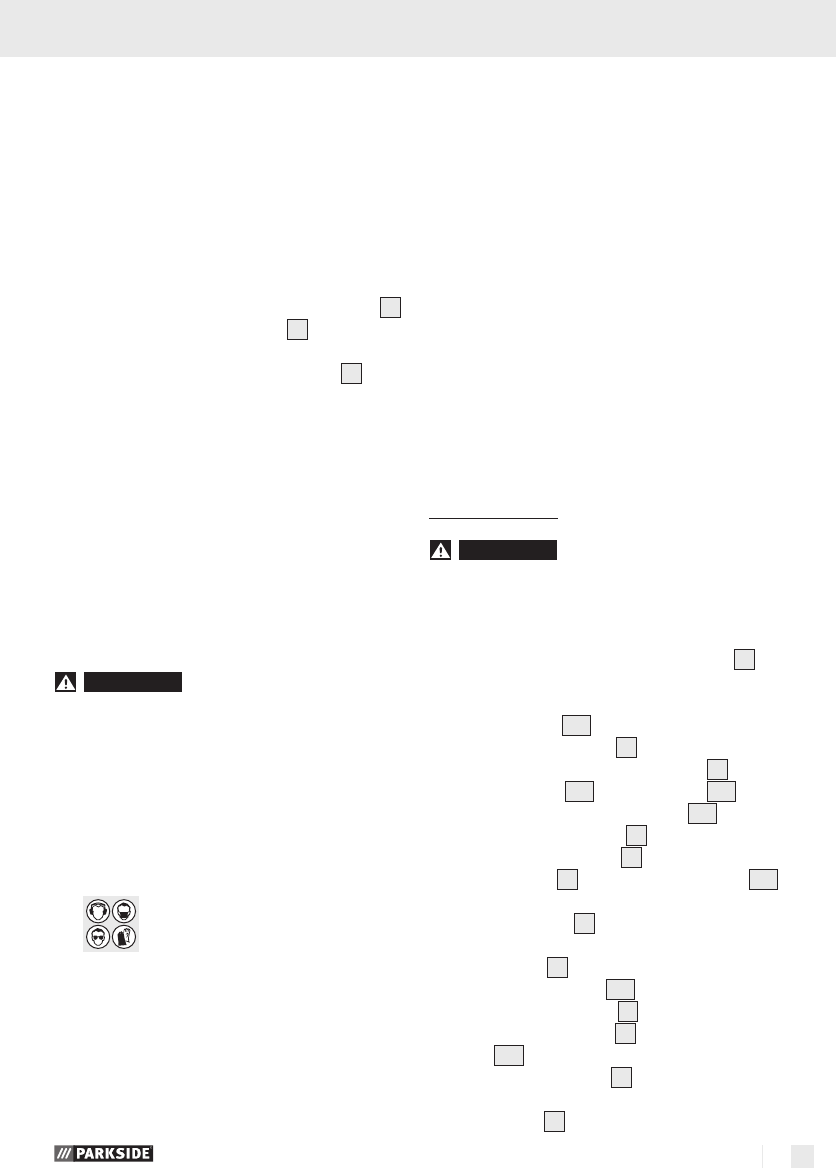
9 GB/IE/CY
suitably qualified person or at the Customer
Service Centre.
J Always work with the mains lead leading
away from the rear of the device.
J If a dangerous situation arises, pull the mains
plug immediately out of the mains socket.
J Always switch on the electrical power tool before
moving the workpiece against it. Otherwise
there is the risk of kickback.
J Do not cut moist materials or damp surfaces,
J Use only undamaged, defect-free saw blades
7
.
Distorted or blunt saw blades
7
can break or
cause a kickback.
J Ensure that the teeth on the saw blade
7
point
downwards before you mount it in the device.
J DANGER OF INJURY! Keep your hands
away from the area of the saw blade.
J Before sawing, check the workpiece for foreign
bodies such as nails etc. and remove them. In-
jury and / or damage to property may result from
the saw blade striking nails etc. embedded in
the workpiece.
J Always keep the device clean, dry and free
from oil or grease.
J Switch off the device before you remove any
wood residue from around the saw blade.
Otherwise you could become injured.
WARNING!
HAZARDOUS DUSTS /
VAPOURS! Any noxious dusts or vapours
generated from sawing represent a risk to the
health of the person operating the device and
to anyone near the work area.
J Do not saw materials containing substances
harmful to health.
J Do not use the tool on materials containing
asbestos. Asbestos is a known carcinogen.
J Make sure you have adequate ventilation.
J Wear protective glasses, hearing
protection, dust protection masks
and protective gloves.
Q
Advice on use
J Push the workpiece slowly and with minimum
pressure on to the saw blade.
J Reduce the rate of advance when you are
cutting thicker material.
J Hold the workpiece firmly on the table with
both hands and push it slowly towards the saw
blade. Otherwise the saw blade may twist or
break.
J Avoid making any sharp changes in direction
during sawing to prevent the saw blade from
twisting or tearing.
J Before starting the saw cut, drill a hole at a
corner or internal cut-out in the workpiece and
start sawing from the hole.
J Use the correct saw blade. The choice of saw
blade depends on the thickness and type of
material and the intended cut.
Select a saw blade with fine teeth to saw thin,
hard materials.
Use a narrow saw blade to saw small radius
cuts.
Q
Assembly
WARNING!
DANGER OF INJURY!
Pull the mains plug out of the socket before you
carry out any task on the device,
Q
Attaching the blade guard
9
(see Fig. A)
j Push the screw
10 c
from the inside through the
slot in the blade guard
9
.
j From the outside of the blade guard
9
, place
the guide plate
10 b
on to the screw
10 c
.
The bent-up side of the guide plate
10 b
engages
around the blade guard
9
.
j Attach the blade guard
9
between the two at-
tachment arms
11
and insert the two screws
10 c
through the openings provided for them in the
attachment arms
11
.
j Ensure that the upwardly curved end of the
blade guard
9
is at the top.
j Put the plain washers
10 a
on from the outside
of the attachment arms
11
.
j Screw the knurled nuts
10
on to the two screw
ends
10 c
.
j Slide the blade guard
9
into the desired posi-
tion and fix it in that position by tightening the
knurled nuts
10
.
Safety advice / Assembly
33383_SCROLL SAW_Dekupiersaege_Content_LB6.indd 9 23.07.09 11:29















